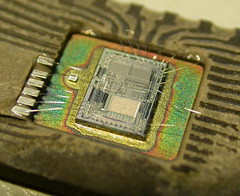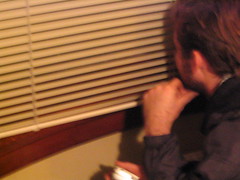
c. 2004a by Clara Natoli
Used with permission.
my family bought a computer equipped with a 300 baud modem when i was in the eighth grade. the modem was the most exciting thing about the computer, though the sixteen color EGA monitor was no small shakes. ever since i read about the ability of computers to talk to one another, i'd been longing for access to the online world. the Knoxville News Sentinel published an article about electronic bulletin board systems soon thereafter ("Bulletin Board System," 2007). i wrote the newspaper to ask for telephone numbers for local BBBs. the author wrote me back with a list, and thus began my online life.

c. 2006 by Ioan Sameli
Used with permission.
Used with permission.
women were not absent from the computer nerd crowd i came to know, but i was aware from the beginning of an unmistakable gender imbalance. nevertheless, with the exception of one pervert who briefly stalked me via electronic mail on one BBS, i wasn't subject to any overt sexually aggressive attention. i asked the sysop to block any email from that person to my account ("Sysop," 2007).

c. 2006 by Kate McCarthy
Used with permission.
Used with permission.

c. 2007 by Gary Jungling
Used with permission.
Used with permission.
when i started college, i finally had access to the internet through an unimaginably fast ethernet connection. before long, i stumbled upon IRC and MUDs ("Internet Relay Chat," 2007; "MUD," 2007). within my first weeks of school, i was a battle-hardened veteran of online harassment. one of my first IRC experiences was having a guy ask me what i was wearing before trying to have netsex with me. when i declined to oblige him, he followed me from channel to channel bombarding me with intrusive questions and innuendo regarding my sexual experiences.

c. 2005 by skippy13
Used with permission.
Used with permission.
my female online persona died the death of a thousand cuts. every other person i met on the internet expressed astonishment at things i knew or interests i had because i was female. i was unable to chat on IRC with a feminine handle because i received too many unsolicited invitations to talk privately. finally, i gave up and began using gender-neutral handles. i lurked more than i participated. what never ceased to amaze me was the constant refrain, "Where are the women?"

c. 2004b by Clara Natoli
Used with permission.
Used with permission.

c. 2006 by Ed Schipul
Used with permission.
Used with permission.
although it seems incredible to me now, i didn't understand that my fear and discomfort with being openly female online was actually the intended effect of the harassment that drove me to hide behind gender neutral handles. neither did i associate online harassment with the street harassment that made me reluctant to venture far from campus alone after dark. since my early college years, the number of women leading online lives has risen astronomically. unfortunately, the prevalence of online harassment has remained unchanged.
in response to the perennial question, "Where are the women?" in reference to blogging, the BlogHer community was born (Camahort, Des Jardins, Stone, 2006). female bloggers and their supporters can network at the annual BlogHer conference. this is clearly not your mother's internet. as the visibility of women online has grown, my reluctance to be openly female online has dissipated. perhaps that sense of security is misplaced because online harassment of women remains vicious and pervasive, even for women who do not write about controversial topics (Sierra, 2007).
the mainstream media loves to sensationalize the dangers of the internet. stories about men who kidnap, rape and murder women they meet on the internet accomplish the same goals as stories about rapists and murderers on dark and empty streets: they send the message that women are always in danger in public spaces. they normalize kidnapping, rape and murder as a natural consequence of women participating in a public space rather than a consequence of the ingrained belief that women have to pay a price for participation. they do nothing to increase women's safety or their presence in the online world. they force women into hiding in the same way that online harassment itself does.
Bulletin Board System. (2007). In Wikipedia: The Free Online Encyclopedia.
Camahort, Elisa, Des Jardins, Jory, & Stone, Lisa. (2006, January 28). Where did the idea for BlogHer come from?. In About this community (About BlogHer). Retrieved July 19, 2007, from: http://blogher.org/about-blogher
Compuserve. (2007). In Wikipedia: The Free Online Encyclopedia. Retrieved July 17, 2007, from: http://en.wikipedia.org/wiki/Compuserve
Feminism. (2007). In Wikipedia: The Free Online Encyclopedia. Retrieved July 18, 2007, from: http://en.wikipedia.org/wiki/Feminism
Internet Relay Chat. (2007). In Wikipedia: The Free Online Encyclopedia. Retrieved July 17, 2007, from: http://en.wikipedia.org/wiki/Internet_relay_chat
Jungling, Gary. (Photographer). (2007). Day 161: Keyhole. [Photograph]. Retrieved July 18, 2007, from: http://flickr.com/photos/jugbo/479186695/
MUD. (2007). In Wikipedia: The Free Online Encyclopedia. Retrieved July 17, 2007, from: http://en.wikipedia.org/wiki/MUD
Natoli, Clara. (Photographer). (2004a). [Untitled photograph of a mask]. Retrieved July 14, 2007, from: http://www.morguefile.com/archive/?display=16897&
Natoli, Clara. (Photographer). (2004b). [Untitled photograph of a mask]. Retrieved July 14, 2007, from: http://www.morguefile.com/archive/?display=16896&
McCarthy, Kate. (Photographer). (2006). Is It Troubling That My Friend Is a Peeping Tom?. [Photograph]. Retrieved July 18, 2007, from: http://flickr.com/photos/soyunterrorista/98062583/
Prodigy (ISP). (2007). In Wikipedia: The Free Online Encyclopedia. Retrieved July 17, 2007, from: http://en.wikipedia.org/wiki/Prodigy_%28ISP%29
Reynolds, Trench. (2006, February 27). Pair of California Teen Girls Missing. MyCrimeSpace. Retrieved July 16, 2007, from: http://www.mycrimespace.com/
2006/02/27/pair-of-california-teen-girls-missing/
Sameli, Ioan. (Photographer). (2006). Old processor's [sic] die. [Photograph]. Retrieved July 18, 2007, from: http://flickr.com/photos/biwook/153062318/
Schipul, Ed. (Photographer). (2006). Shark. [Photograph]. Retrieved July 17, 2007, from: http://www.flickr.com/photos/eschipul/265735753/
Sierra, Kathy. (2007, March 26). Death Threats Against Bloggers are not "Protected Speech" (Why I Cancelled My ETech Presentations). Creating Passionate Users. Retrieved July 10, 2007, from: http://web.archive.org/web/20070330051600/
http://headrush.typepad.com/creating_passionate_users/
2007/03/as_i_type_this_.html
Skippy13. (Photographer). (2005). Shark. [Photograph]. Retrieved July 17, 2007, from: http://www.flickr.com/photos/skippy/8476591/
Sysop. (2007). In Wikipedia: The Free Online Encyclopedia. Retrieved July 17, 2007, from: http://en.wikipedia.org/wiki/Sysop
Usenet. (2007). In Wikipedia: The Free Online Encyclopedia. Retrieved July 18, 2007, from: http://en.wikipedia.org/wiki/Usenet
2 comments:
i recall the controversy surrounding the train wreck known as xoxohth, the board dubbed "the most prestigious law school discussion board in the world" and which is frequented by foul-mouthed misogynists and general scumbags. one of the administrators of that board just had his employment offer revoked from a top law firm.
justice is served. sometimes.
you took the words out of my mouth. i plan to write about xoxohth and autoadmit too because it dovetails really nicely with the topics i brought up here.
Post a Comment